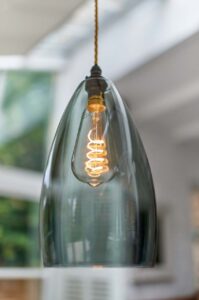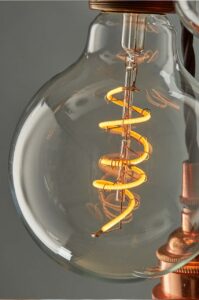With the banning of halogen bulbs in the UK, even more people are questioning what is LED and why are LED bulbs better than halogen?
To understand more about light bulbs, halogen and the UK’s switch to LED, we spoke to Chris, CEO and co-owner owner of WellLit – the only company that we trust for our light bulbs.
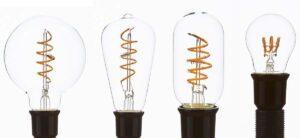
Why are halogen bulbs being banned?
To help us all enjoy a cleaner future. Halogen lamps use about 70 – 80% more energy than LED lamps, have a very short lifespan and are responsible for significant and needless C02 emissions. If every UK home switched to LED from Halogen then it was calculated that it would save about 1.5 million tonnes of CO2 per year.
What light bulb wattage do I need?
Firstly, I would say ignore wattage and concentrate on lumens instead. A lumen is the measure of the total quantity of visible light emitted by a light source. So the lumen count is going to give you more information than wattage.
Below is a rough idea of the lumens required to replace traditional lamps, but when designing a lighting scheme bear in mind that if you have an area with multiple bulbs in close proximity, such as a chandelier or pendants, then the lumens should be accumulated together. So instead of having one 600 lumen bulb, you can have three 200 lumen bulbs which will also help spread the light more evenly over an area.
50w Halogen – 350 Lumens / 93+ CRI / 2700k
40w Incandescent – 470 Lumens / 93+ CRI / 2700k
60w Incandescent – 810 Lumens / 93+ CRI / 2700K
What to look for in an LED bulb?
- Look at the company and the people behind it to make sure you are purchasing from a company who invests in ethical and sustainable manufacturing processes.
- Colour Temperature – 2200k is going to give you a lovely warm glow for relaxing and 2700k is going to be perfect for task lighting and replacing traditional lamps. The lower the colour the warmer it will be (1700k for candle light) and 5000k and above will represent daylight.
- CRI – A score out of 100 that shows how well a light source will render the colours of the objects it illuminates. You absolutely need to be looking at 90+
What does CRI mean?
CRI stands for Colour Rendering Index. It is a measure, out of 100, that defines how well a light source will show up the true colours in illuminates. So if you are a person who has invested in some beautiful interior pieces, you don’t want your lighting to wash all the colours out and everything to look dull. So you want to look for as high a CRI as possible and certainly 93+ !
Why choose LED Bulbs?
They are the most energy efficient light source, help to dramatically reduce C02 emissions, have a far long lifespan than traditional lamps and the quality of light and dimming performance is now as good as it used to be with halogen and incandescent lamps.
What shape bulbs are there?
Here at Fritz Fryer, we offer 4 different bulb types; pear shaped, globe shaped, golf ball shaped and the mini tube. There are some lights that arethe perfect pairing with a bulb – here are just some of them…
PEAR SHAPED LED BULB
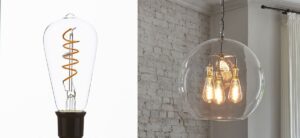
An LED Spiral Pear Shaped Filament Bulb looks gorgeous in a Hereford 3-way Centre
GLOBE SHAPED LED BULB
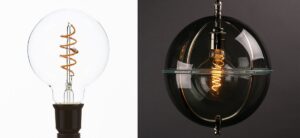
Showcase the unique Large Globe Filament LED Bulb through the glass one of our most customisable shades – the Grafton Globe!
GOLF BALL SHAPED LED BULB
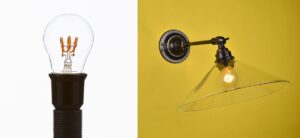
This cute little LED Golf Ball Filament Bulb is the perfect pairing with the classic design of the Hay Coolie.
MINI TUBE LED BULB
Smoked glass really does make this Mini Tube Filament Bulb look extra special, especially in this sleekHereford Globe!
A huge thank you to Chris from Well-Lit for all this incredible information and for always keeping our lights shining! Check out their website and get to know the only lightbulbs we trust!
Need a little more help?
Speak to a member of our team today and receive personalised advice about how to choose LED bulbs.


